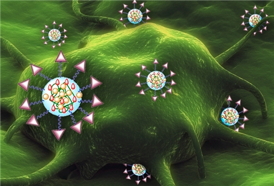Nanoparticles Utilized to Improve Cancer Treatment
Iranian researchers at Tarbiat Modarres University used nanoparticles containing anti-cancer medicine to produce a new targeted drug delivery system to deliver drug to the damaged tissue.
The new system can be used in the delivery of various drugs used in chemotherapy for cancer treatment.

In this research, albumin nanoparticles containing 5-fluouracil anti-cancer drug was produced firstly. Then, an anti-MUC1 monoclonal antibody entitled PR81 was attached covalently to the surface of the nanoparticles in order to effectively deliver the mentioned drug to the cancer cells. The attachment of antibody to the surface of nanoparticles containing drug enables the drug to carry the medicine specifically to cancer cells, and it minimizes the damage of the healthy tissues.
In this research, bovine serum albumin (BSA) nanoparticles containing 5-fluouracil medicine were synthesized through dissolubility method. Then, PR81 anti-MUC1 monoclonal antibody was attached to the albumin nanoparticles containing the medicine by using two-end active pegging attachment taking into consideration the free amine groups in the surface of nanoparticles and free sulfur groups created on the antibody structure.
Attachment of antibody and nanoparticles was confirmed by enzyme linked immunosorbant assay (ELISA) method. In-vitro evaluation of the synthesized target system on MCF7 cells showed the higher performance of the system in removing cells in comparison with the free drug. In addition, the system is able to conserve its physical, chemical, and biological stability for 20 days at room temperature.
Results of the research lead to the production and confirmation of a new drug delivery system based on albumin nanoparticles, which can be used for the delivery of various drugs used in chemotherapy for the treatment of cancer.
Source: Nanotechnology Now
- 429 reads
Human Rights
Fostering a More Humane World: The 28th Eurasian Economic Summi

Conscience, Hope, and Action: Keys to Global Peace and Sustainability

Ringing FOWPAL’s Peace Bell for the World:Nobel Peace Prize Laureates’ Visions and Actions

Protecting the World’s Cultural Diversity for a Sustainable Future

Puppet Show I International Friendship Day 2020

